Houston Rockets
Jeremy Lin’s Big Test
Carl Fudge analyzes the strengths and weaknesses of Jeremy Lin and stresses the importance of the Rocket point guard getting out of the gate strong.
Published
12 years agoon
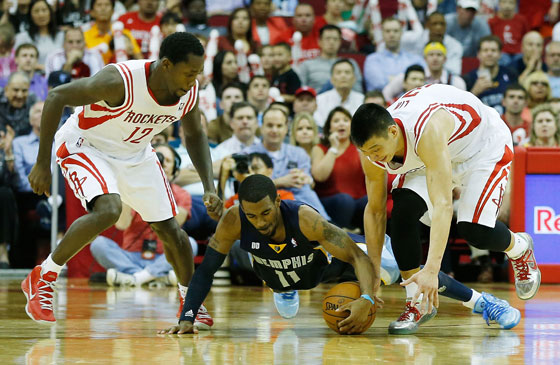
For the third straight year, Jeremy Lin comes into a Rockets training camp with a different role to play
Houston Rocket training camps have been interesting times for Jeremy Lin. Cut from the team two years ago, the 25-year old point guard returned to Houston last season as a flashy free agent acquisition following his unprecedentedly “Linsane” performances in New York. Houston general manager Daryl Morey prized the resurgent Harvard grad away from the Knicks with an infamous poison pill contract as Lin looked set to install himself as Houston’s point guard of the future, team leader and global icon that had been missing since Yao Ming retired.
How things have changed.
As training camp sets to kick off this weekend, Lin finds himself starting alongside All-Stars James Harden and Dwight Howard in a powerful lineup that has legitimate championship aspirations. While Lin was front and center of the team’s marketing efforts last season, this year he has seemed a secondary figure, hardly being featured in the team’s marketing campaigns and not called upon to help recruit Dwight. While Lin was the unquestioned choice as the team’s starting point guard last season, legitimate questions exist about his role on the team this year. Make no mistake, this is a pivotal time in Jeremy Lin’s career as a Rocket.
Just how good was Lin in 2012-2013?
No player in recent memory has sparked as much debate as the Rockets’ #7. Given the amount of attention and analysis he has generated since his Linsanity days, it can be hard to understand the real story and – to borrow a phrase from Nate Silver – separate the signal from the noise.
Let’s start with some of the things Lin did well.
2012-2013 was Jeremy Lin’s first full season as a Houston Rocket and as a starting point guard. He started every single game of the regular season, logging the third highest amount of minutes on the roster and guiding the team to a winning record and playoff berth.
Lin’s averages last year – 13.4 points, 3 rebounds and 6.1 assists – were solid but perhaps a bit underwhelming to fans who had hoped for Linsanity numbers and didn’t factor in his lower usage rate on the Rockets (20.7%) compared to his time on the Knicks (28%). While some fans questioned Lin’s performance, Morey clearly laid out why he was happy with his point guard’s debut season during an interview on CBS Sports Radio 610 back in May, saying:
Jeremy had a great year. The only way to think about Jeremy maybe not having a great year would be to say he had to play the whole year like he did in New York. James and Omer generated the most wins for our team but Jeremy Lin was third and on a 45-win team to make the playoffs and be the starter, he had a great season.
He’s the fifth-best pick and roll player in the league on nine pick and rolls a game. Overall, he really helped our offense, set up his teammates very well. On defense people focus a little bit too much on Tony Parker maybe did well against him, or some of these super fast guards, but the reality is those players do really well against everybody. On average, Jeremy had a very good defensive year, he’s very good at 50-50 balls, he’s very good at distributing the ball, and one of the top players in blocked shots and steals. So, overall, he had an extremely good year and we’re nowhere near the playoffs without Jeremy Lin.
Morey’s analysis, as always, is backed up by the numbers. Jeremy Lin was indeed the 5th best NBA pick-and-roll point guard in terms of points created for the roll man, setting up Rocket screeners nicely as they cut to the basket. This stat is even more impressive considering the somewhat limited offensive skillset of the recipient of most of those passes, Omer Asik. As I laid out in my last piece, the pick-and-roll is a fundamental part of the Rockets’ offense, and with Dwight Howard now on the floor, Lin and the Rockets will only become more dangerous in this facet of the game.
Lin was a good distributor of the ball in other parts of the offense last season too, dishing out 497 total assists (15th best in the NBA) at 6.1 assists per game (20th best). The majority of Lin’s assists led to dunks, close shots and three-pointers, showing both his ability to set teammates up for high quality shots that fit the game plan and his competence in running the fast break.
As a creator of his own offense, his performance dipped compared to his hot streak on the Knicks — Jeremy’s points per possession in isolations went down from 1.02 to 0.68. However, one thing that stood out was his ability to draw fouls while in the act of shooting. He finished 12th among point guards in And1% (And1s/FGA), and 17th in free throw rate (FTA/FGA), putting him above the likes of Kyrie Irving in both categories.
Lin was effective defensively too, and is probably a bit underrated in that part of the game. While he seemed to struggle staying in front of some of the quicker guards, Lin still contributed 1.6 steals per game (11th best among PGs in the NBA), 0.35 blocks per game (also 11th best), and took 0.27 charges per game (12th best among PGs). When you combine the previous 3 stats into a jumbo defensive rating, Lin was the 9th best defensive PG in the NBA.
Three-point shooting, turnovers, mental toughness have been concerns
Despite Morey’s faith in Lin, critics do have a point to make. While the Rockets’ biggest positional disadvantage last year was power forward, the point guard position wasn’t far behind. Compared to their opponents, the Rockets had a PER (Player Efficiency Rating) deficit of 2.1 every night at the point guard spot, scoring two less points, delivering one less assist and committing one more personal foul.
One thing that has rightly caused concern among Rockets fans is Lin’s shooting percentages. The Rockets’ uptempo offense is designed to create a lot of open three-point shots, especially from the wings; last year the team took 2,371 shots from beyond the arc and made 867, the second highest total in NBA history by a team in one season. Three-pointers will be even more key this year with Howard and Harden certain to attract their fair share of double teams, leading to open shots on the perimeter.
Last year Lin took 257 three-pointers – over 10% of the team’s shots from that distance – and made 87 of them, good for a 33.9% average. That level of efficiency puts Lin outside the top 100 best three-point shooters in the league and well below the better three-point shooting point guards in the NBA, such as Jose Calderon (46.1%), Steve Nash (43.8%), Mario Chalmers (40.9%), Jarrett Jack (40.4%), and Irving (39.1%).
There’s no disguising Lin’s shooting numbers, but glimmers of light do exist. Lin shot about 5% higher from three-point land at home than he did away. His numbers from downtown (39.3%) in the final 34 games of the regular season were much better than his early season efficiency. And lastly, his most effective shots came from spot-ups, exactly the shots he’ll see more of with Dwight on the floor. With more experience in the league’s different arenas, less defensive attention on him and lots of offseason practice, it is fair to expect him to convert his treys this season at a much higher clip.
Turnovers were also a concern. His assist-to-turnover rate was a Jrue Holiday-esque 2.13, putting him outside the top 30 PGs in the league. Adding to that was his turnover ratio (% of possessions that resulted in a turnover), which at 13.3% was the fourth highest in the league. Lin’s turnovers were caused more by bad passing (131) than by bad ball handling (89) and that number probably suffers a bit due to the fast pace the Rockets employ. With that said, Lin coughed up the ball as much in pick-and-roll situations (20.9% of these possessions led to a turnover) as he did in transition (21.1% of his transitions led to a turnover), suggesting a need for better decision making with the ball and playing more under control.
A final concern exists around Lin’s mental makeup. By his own admission, he struggled with this facet of his game last year. Describing the challenges he faced last season as a Rocket and his mentality moving forward, Lin said:
“I’m just going out there to play and not worry about anything: about proving myself to anybody, or proving my worth, or trying to live up to a contract, or whatever. I’m just going to go out there and play completely free of all the expectations and all the noise, the pressure. With the signing of Dwight and the emergence of James, there’s going to be a lot more spotlight, but for me it’s just a matter of going in everyday and doing my best. I’m just going to play the way that got me here.”
Will below average be good enough?
While there is no glaring hole in Lin’s game, he also doesn’t have an elite skill either. He’s an above average passer and defender that runs the pick-and-roll well, but he’s a below average shooter, ball handler and creator of his own offense. When you add it all up and stack him up against a league that’s full of quality point guards, you get a player whose PER output (14.9) is below average for his position (16.2) and puts him just outside the league’s top 30 playmakers. While the PER stat isn’t loved by all, other advanced stats tell a similar story: he didn’t make the top 15 of a recent WARP-based projection of the NBA’s top point guards and he ranks 27th among point guards in both Value Added and Estimated Wins Added. Championship-winning teams do not have to be elite at every position, but with only two All-Stars, the Rockets need to squeeze every drop of performance out of their point guard spot if they are serious about contention.
What could happen if Lin has a slow start
Lin is the clear starter, but if he returns to his past struggles from the three-point line, commits too many turnovers or fails to gel with Dwight, it could lead to him being replaced in the starting lineup in favor of Patrick Beverley, who played well last year as Lin’s backup. Though Beverley’s minutes constitute a smaller sample size (710 minutes), the Rockets as a team posted a 98.8 Defensive Rating when he was on the floor (compared to 104.0 with Lin), a ranking that would be good enough to be third best defense in the league. To add to that, there was almost no dip offensively (106.4 Offensive Rating with Lin on the floor, 106.1 with Beverley).
While it is not plan “A”, it is possible that the Rockets could be more dangerous with Lin on the bench than when he starts. In Asik and Lin, the Rockets could deploy two starting-quality players against other teams’ second string lineups, a configuration that would allow Lin to be a #1 offensive option. Lin has played well in that role in the past with the Knicks in 2011-2012 and in bursts last year, with his breakout 38-point night coming against the Spurs when Harden was out with an injury.
The Rockets won’t rush any decision. They understand the value of lineup stability and will want to collect a reasonable sample size of data to analyze both his and Beverley’s play before deciding that a change is needed. Suggestions in the recent ESPN Insider piece that Coach McHale might change his lineup based on training camp and preseason were probably a bit aggressive. The theory I have heard from an NBA source is that the Rockets will give the new Dwight-led lineup 20 games to gel before making a move of this magnitude.
Of course, coming off the bench was not what Lin had in mind when he signed his $25M contract last year, but with Howard and Harden now in the fold, the bar of expectations has been raised and the need for the right fit has increased. If he takes a step forward and proves to have addressed some of his weaknesses, he can cement his role as the starting point guard on a contending team.
Now we see if he’s ready for that new challenge, because for the scholarly Lin, the first 20 games of the 2013-2014 NBA season will be the biggest exam he has ever taken.
Carl Fudge is a second year MBA at MIT Sloan where he is the content lead for the Sloan Sports Analytics Conference. He is a lifelong Rockets fan and has been posting on ClutchFans as GBRocket since 2003.
Carl Fudge is a former MIT Sloan Sports Analytics Conference organizer and long time Rockets fan.

You may like
-
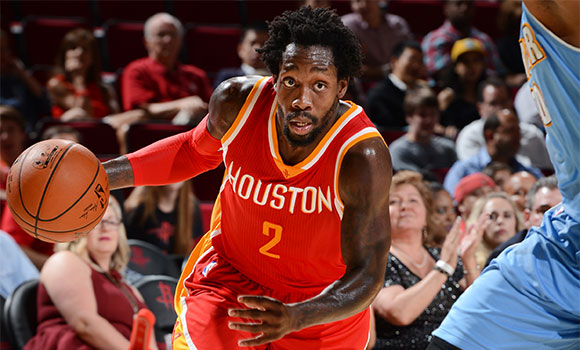

Patrick Beverley: “I went to jail for EZ Tag”
-
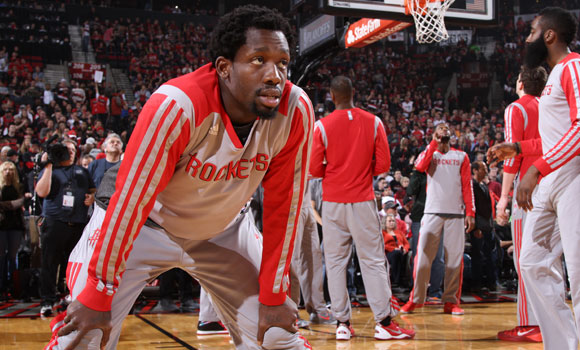

Will Carroll Q&A: Beverley’s knee remains a “fairly major concern” for Rockets
-
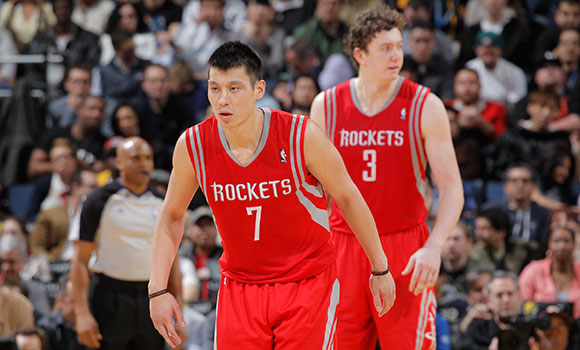

Hey, Remember when Jeremy Lin and Omer Asik were on the Rockets?
-
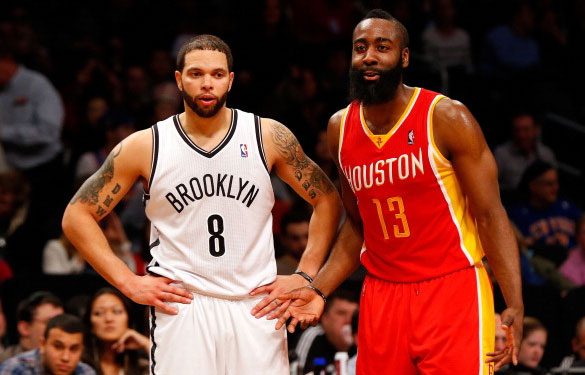

Report: Nets could be open to dealing Deron Williams for Lin, Asik
-
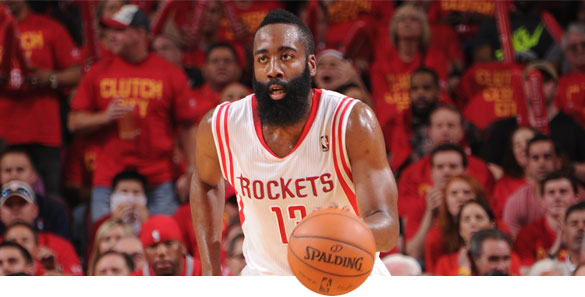

Podcast: Rockets take Game 5, but Harden still in a deep funk
-
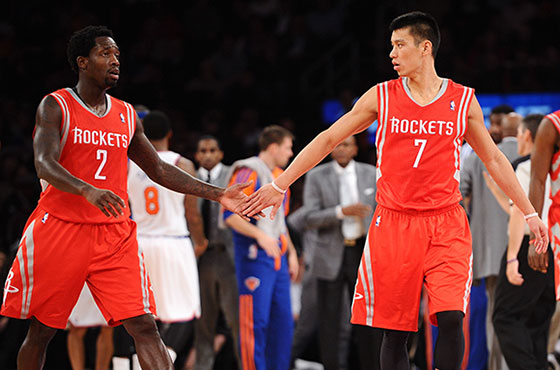

The numbers are clear: Patrick Beverley deserves to start over Jeremy Lin
Houston Rockets
Looking Back on the Trade for Phoenix’s Draft Picks
Are the Rockets set to cash in on Phoenix’s downfall or could a Suns retool murky the waters?
Published
4 months agoon
March 12, 2025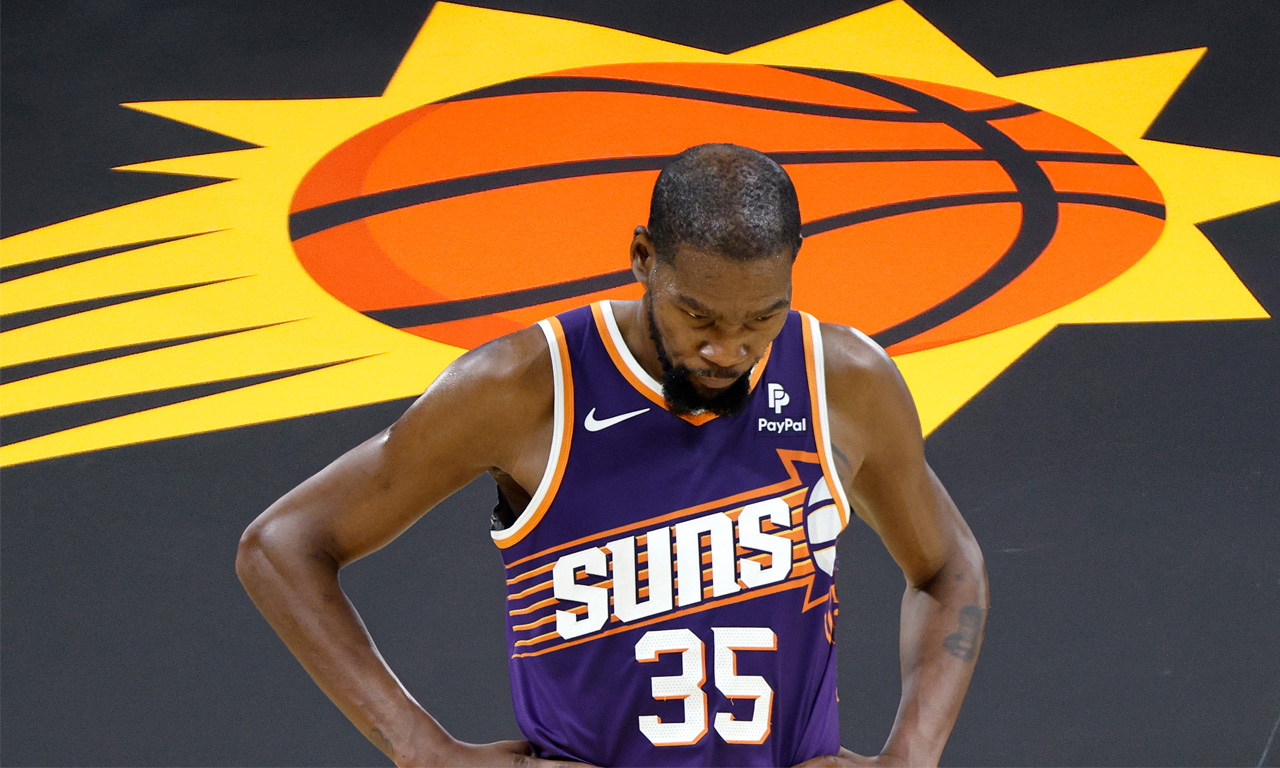
As the Houston Rockets set to host the Phoenix Suns tonight, it seems the right time to take a look back at the trade that linked these two franchises together for the foreseeable future.
This past June, the Rockets made a trade with Brooklyn that sent back to the Nets control of their 2025 and 2026 unprotected first-round picks. In exchange, the Rockets received a large chunk of Phoenix’s future (2025, 2027, 2029) and control of the Dallas Mavericks’ 2029 first.
In essence, the Rockets traded one pick and one swap for two picks and two swaps. All unprotected.
Thoughts At The Time of the Trade
If I’m going to discuss the current outlook of this trade, I have to be honest about how I saw it at the time of the move. While I didn’t hate this trade initially, I definitely didn’t love it either.
I liked that the Rockets increased their overall trade assets. I also liked that they extended the timeline to be able to make a bigger trade and I also appreciated that they kept control of the 2027 Brooklyn swap.
But I didn’t like that the Rockets gave up what seemed like the more established value (Brooklyn) for a more uncertain gamble (Phoenix). The Rockets did not control a “tanking runway” of picks to offer back to Phoenix — all of the picks Houston got in the deal were in staggered years (’25, ’27, ’29). I also felt Brooklyn, who badly needed to rebuild, got away with paying market value to get their picks back despite the fact that the Rockets invested years in watching those picks appreciate up to the point that they had the Nets completely over a barrel.
Net-net: I felt like more certainty was traded for less certainty and it was more of an equitable trade for both teams rather than Brooklyn paying dearly to get back the things only the Rockets could offer.
There were two ways I thought this trade could pay dividends: The Suns needed to flame out immediately, as in this season (unlikely), or the Rockets could trade all those pick assets as part of a deal for a real superstar in the next 12-18 months (more likely).
In a testament to how quickly change can occur in a very unpredictable NBA, four things have happened that have been positive indicators for the Rockets in making this move.
The Suns are fading
While Phoenix had major salary cap issues, dealing with the second apron, they didn’t appear to have problems on the court. They jumped out of the gate 8-1 and looked like a legitimate contender behind their star trio of scorers in Kevin Durant, Devin Booker and Bradley Beal.
Given Houston controlled Phoenix’s pick this year via a swap, it looked like the Rockets would come up empty-handed on the trade this season.
That changed quickly.
Injuries, serious depth concerns and a lack of a defensive identity has sent Phoenix spiraling. Booker’s availability has been inconsistent, forcing Durant to carry the load, while Beal has not quite fit in at all. Their financial limitations, thanks to owner Mat Ishbia’s all-in spending spree, have handcuffed their ability to improve the roster around the three stars.
The Suns are sitting 11th in the West, having gone 22-34 since that hot start, and are currently trying to catch a depleted Dallas squad to get back into the play-in picture.
As of right now, the Rockets project to end up with a lottery pick (albeit a late one) this season out of the trade.
Phoenix was caught shopping Durant
Because the Suns struggled so hard after the start, they tried to make a major move at the deadline but could not unload Beal, in large part due to his no-trade clause.
As a result, they may have made a misstep: They openly tried to trade Durant, which inevitably became public news.
Now? Durant will almost assuredly be traded this summer — likely to a destination that he handpicks. This means the Phoenix Suns will have to look at all possibilities for their future, including potentially having to give Rafael Stone and the Rockets front office a call.
But keep in mind, the Rockets can not offer Phoenix the ability to completely rebuild via the draft right now. Phoenix’s 2026 pick is controlled by Washington. They would have to get extremely creative to set that stage. A retool in Phoenix is much more likely.
Could Brooklyn have been better than expected?
This one is tougher to gauge.
The Brooklyn Nets are currently tied for fifth-worst team in the league, giving them strong lottery odds this summer. This was expected. After all, the Nets, even with a healthy Mikal Bridges and a full roster, were not a good team last season, closing the year 20-41 in the final three quarters of the season. The Rockets ended up with the #3 pick (Reed Sheppard) as a result of Brooklyn’s mediocrity.
However, if the Rockets had not placed that pick back in Brooklyn’s hands, would the Nets be better than this?
Brooklyn brought in a new coach in Jordi Fernandez that has had a positive impact. They have dumped off players, such as Dennis Schroeder and Dorian Finney-Smith, that impacted winning. The bar to make the play-in in the East (.415 winning percentage) is obscenely low, with Brooklyn being just five wins away from it at the moment.
And on top of that, Brooklyn did have lots of draft capital that they could have moved to try to win now.
It’s very tough to say as you don’t know if a team with Bridges still in Brooklyn might have actually been worse than this current squad, but you could make a case that the pick the Rockets would have ended up with from Brooklyn this season would be eerily similar to the one they will end up getting from Phoenix this year.
Again, this is a tough call.
Nico Harrison Hooked the Rockets Up
As part of the trade, the Rockets got control of the Dallas Mavericks’ 2029 first-round pick (unprotected, of course). While there’s really no way of knowing what a pick will be five years out, we did know that Luka Doncic would be just 29-30 years old that season and it was fairly etched in stone that he would be the core piece of a Dallas squad that season.
Enter chaos in Dallas.
Doncic was shipped out in the trade that shocked the world, which could have a major impact on the Rockets. Dallas’ current core of Kyrie Irving and Anthony Davis will be 37 and 36 years old that season, respectively.
On paper, the value of that pick shot up.
Final Summary
Right now, the outlook on these picks looks strong. One source stated off the record that they feel the 2029 Phoenix pick is the best pick asset out there that is owned by another team. The Rockets would be reluctant to add that one specifically into any trade unless it’s for a truly legitimate star.
But if there is any lesson that the NBA teaches us over and over again, it’s that it’s very hard to predict where a team will be a year from now, much less three years from now.
Can the Rockets pressure Phoenix and leverage the ownership they have of their draft capital to get what they really want (Booker) from them? Could a Suns retool around Booker and Beal, with the right pieces and assets acquired from a Durant trade, significantly change their on-court outlook and cap sheet — which in turn could damage the value of the picks Houston controls?
Bottom line is it has worked out well this season, and the future forecast at the moment is promising. The current value of those future picks appears strong. What will likely determine history’s final grade for this trade will be how it sets them up for the trade to come, and that’s where fans will be looking to Stone and the front office for action starting this summer.
Houston Rockets
Amen Thompson’s ankle injury will be re-evaluated in one week
“The things he does you can’t replicate,” says Rockets coach Ime Udoka
Published
4 months agoon
March 10, 2025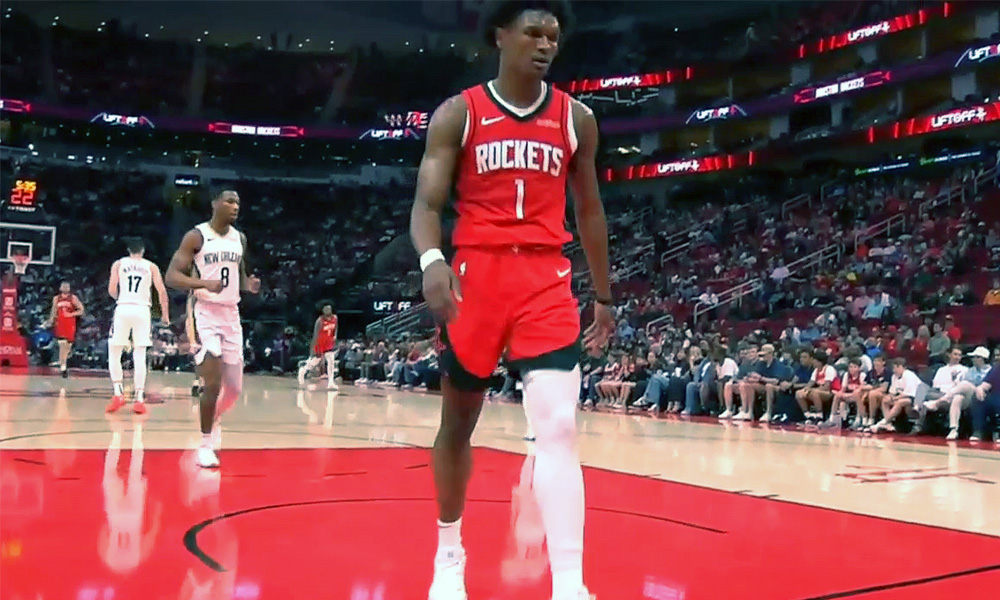
Rockets young star Amen Thompson will have his ankle injury re-evaluated in one week, according to Ime Udoka.
Thompson had an MRI on Sunday and the Rockets coach confirmed all imaging (X-ray, MRI) was negative.
“Just some swelling and pain, obviously,” said Udoka.
If you listen to Udoka, you can tell he knows how special Amen is to this team. He said the Rockets are missing a lot by not having him out there.
“Obviously, the things he does you can’t replicate,” said Udoka. “[Amen is] a guy that plays every position for us. When one goes down, he runs the point. If another is out, he runs the four.”
Amen is one of the best defensive players in the game, and as a one-on-one defender of guards/wings, he might already be the best in the league in just his second season. He’s holding his opponents to 40.5% shooting from the field, tops in the league.
“He’s a very unique defensive player,” said Udoka. “We got some guys that do some great things there, but I like to put him and Dillon on the best two usually, night to night. You got Tari and that’s a luxury as well, but the way he goes about it is different. His athleticism, size, speed, strength, shotblocking ability, steals… he’s all over the place.”
“Hard to replicate for sure.”
Amen injured his ankle late Saturday night in a blowout win against the Pelicans, but the unfortunate part was he probably should not have been on the floor in the first place.
The Rockets left Amen Thompson in the game in a blowout to get one more rebound for a triple-double and he just got injured. He's heading to the locker room with a limp. https://t.co/UBtrEpgWuU pic.twitter.com/D8GeKP8sQk
— ClutchFans (@clutchfans) March 9, 2025
The Rockets had built well over a 30-point lead by early fourth quarter. Jalen Green was able to rest the entire fourth. Alperen Sengun came out of the game with 7-8 minutes left while Dillon Brooks and Tari Eason came out with 6:00 left. But Thompson, who had posted an insane +39 on-off number, remained in the game because he was one rebound shy of a triple-double with 15 points, 11 assists and nine rebounds.
Udoka addressed that decision on Monday before the game against Orlando.
“What I typically don’t do is wholesale substitutions,” said Udoka of the decision to keep Amen in the game. “Albeit 30[-point lead] at six minutes [left] is different than losing to Minnesota, a 16-point lead with four minutes [left].”
“I’ve seen it go both ways in the past. You take out guys too early and have to bring starters back, and vice versa.”
Thompson has played in 60 games this season, five short of being eligible for postseason awards. He absolutely should be up for an All-Defensive nod this season so keep an eye on him getting back in time for that. He would need to return to action no later than April 4th for the game against the OKC Thunder in order to play enough games to be eligible.
Houston Rockets
How the Kyrie Irving Injury Impacts Rockets
Houston’s draft positioning and offseason plans could be impacted by Dallas
Published
4 months agoon
March 4, 2025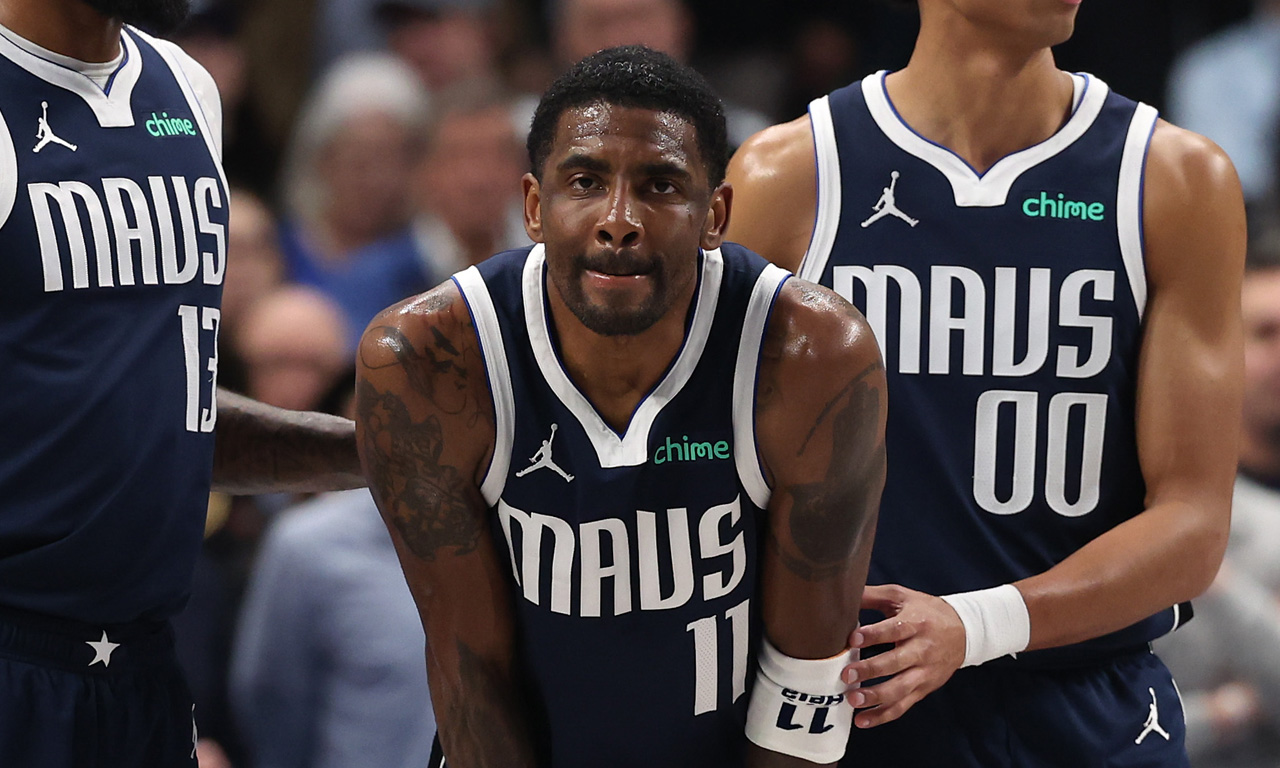
Dallas Mavericks guard Kyrie Irving was injured Monday night and the news dropped on Tuesday that the knee injury is serious — a torn ACL in his left knee that will end his season and a good portion of next season as well.
Brutal. I can’t think of an NBA team that imploded faster than the Dallas Mavericks.
You trade away a 25-year-old phenom who just hoisted you on his back en route to the NBA Finals a year ago. You cashed in that golden ticket to go all-in on a trio of aging stars in Kyrie, Anthony Davis, and Klay Thompson.
Bold strategy, Nico. Let’s see if it pays off.
(Narrator: It’s not paying off.)
The Mavericks had some interesting potential this year and maybe the next couple of years once everyone was healthy, but now? Their star guard is likely out until the calendar year 2026 and Klay and AD aren’t getting any younger nor more durable. The Mavericks may have actually swapped their future for a present that never arrives — and Dallas GM Nico Harrison has to be feeling overwhelming pressure right now.
So how does this impact the Rockets?
For starters, Houston has a game remaining on the schedule against Dallas on March 14th at Toyota Center — Davis may or may not be back for that game.
More importantly, Dallas is the 10th seed in the West at the moment, just 3.5 games ahead of the Phoenix Suns (11th seed). The Rockets control Phoenix’s first-round pick unprotected this season via a swap. We need as many West teams as possible ahead of Phoenix to keep them out of the play-in/playoffs and to push them as deep into the lotto as possible.
This complicates that. Phoenix’s remaining schedule is the toughest in the NBA by a good margin, with plenty of games left against the league’s best teams, so it still looks promising overall — but we’re talking about Kevin Durant, Devin Booker and Bradley Beal. They can still get hot at the right time while Dallas may struggle.
So keep a close eye on that. The good news is the Portland Trail Blazers are one of the hottest teams in the league and they are (shockingly) nipping at the Arizona squad’s heels.
Taking a look ahead to the offseason, the Kevin Durant Pursuit will be big.
This one is a little more complicated for Houston. The Rockets really want Devin Booker but, as of now, the Phoenix plan appears to be to trade KD this offseason and retool around Booker. The Rockets will have interest in Durant but they’re not going to sell the farm (prospects and all the picks) for a 37-year old like they would for Booker.
Three teams that I’ve heard a lot about from Rockets circles that will be in the mix are Houston, Minnesota and Dallas — Timberwolves and Mavericks have been considered the main competition. But, a lot of this will depend on Durant himself and where he wants to play at this stage of his career.
Keep in mind also, if the Suns are “retooling” around Booker and Beal (holding the no-trade clause), then they could be placing a higher priority on win-now players over the return of their own draft assets. The Rockets definitely have the best assets overall to offer up in any trade package between those three teams, but if Phoenix does prefer finding the right ready-to-win players around Booker/Beal, that gives Dallas and Minnesota a real chance.
This injury “may” take Dallas out of the equation, and they are/were definitely a contender for KD’s services given his past relationship with Kyrie and the way Dallas was positioned to win right now. Does KD at his age want to wait for Kyrie to be healthy?
And one last friendly reminder: The Rockets control that Dallas 2029 first (unprotected).
Houston Rockets
Rockets Sign David Roddy to Two-Way Contract
Former first-round pick has played with the Grizzlies, Suns and Hawks
Published
4 months agoon
March 3, 2025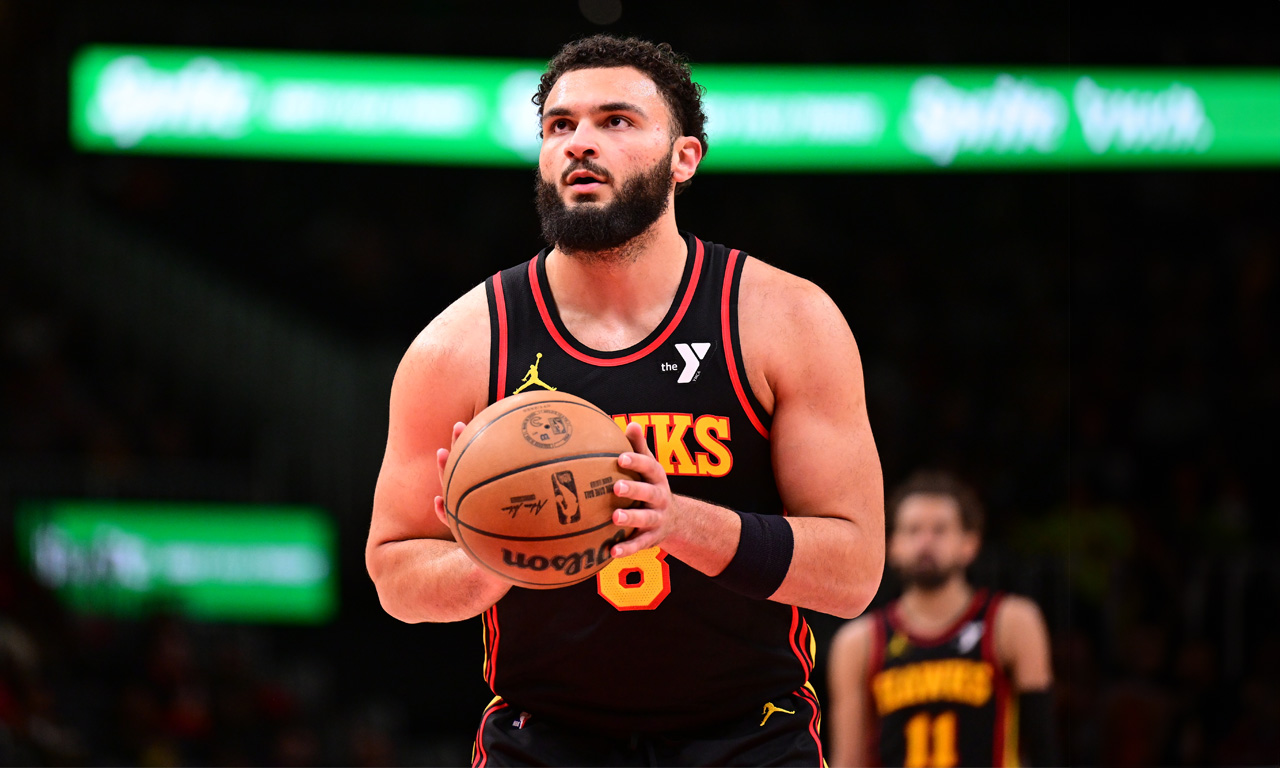
The Rockets made a move on Monday, signing former first-round pick David Roddy to a two-way contract.
The two-way spot opened up after the front office signed Jeenathan Williams to a standard four-year, $8.2 million contract (with friendly team options all along the way).
Roddy is 6-foot-5 and 250+ pounds but sports a 6-foot-11 wingspan. He was taken with the 23rd pick in the first round of the 2022 NBA Draft — six selections after the Rockets drafted Tari Eason. A standout in college, Roddy averaged 19.2 points, 7.5 rebounds, 2.9 assists, 1.2 steals, and 1.1 blocks per game during his junior season at Colorado State.
Roddy, who turns 24 later this month, is a physical player who can play multiple positions. He’s a solid rebounder for his size/position. He has played in 165 games over three seasons with the Grizzlies, Suns, Hawks and most recently Sixers, averaging 6.2 points and 2.9 rebounds per game.
The guard/forward has not shown efficient shooting, however — he’s a career 30.5% three-point shooter and just 68.4% from the line. His defense is better inside than out.
Ultimately, it will be those two things — three-point shooting and defense — that will determine his chances of carving out a consistent role in the league.
All in all, it’s a low-risk signing and the Rockets get a look at a prospect that fits their age timeline.
Houston Rockets
Houston a potential landing spot for Ben Simmons post-buyout?
Published
5 months agoon
February 6, 2025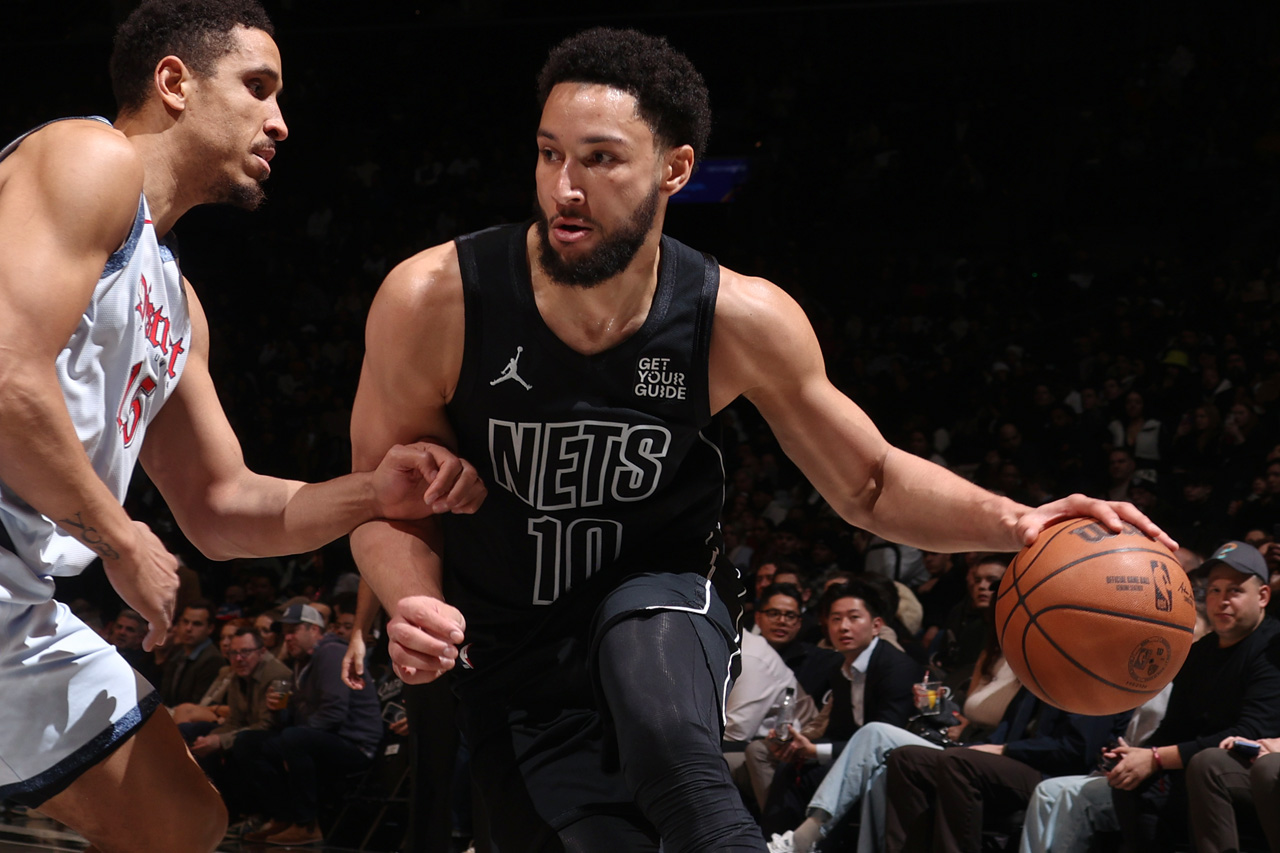
ESPN NBA analyst Brian Windhorst said on Thursday’s NBA Trade Deadline show that Brooklyn Nets forward Ben Simmons is working on a buyout and the Houston Rockets is a potential landing spot for him.
“Cleveland and Houston are two situations for Ben Simmons,” said Windhorst.
Brian Windhorst says the Cavaliers and Rockets are buyout locations for Ben Simmons.
Thoughts? pic.twitter.com/7ly4mvmxr5
— ClutchFans (@clutchfans) February 6, 2025
Advertisement
Rockets coach Ime Udoka was an assistant coach in Philadelphia in 2019-20 when Simmons was with the Sixers, before injuries took a significant toll. In fact, Udoka, when speaking about Amen Thompson earlier this season, brought up some comparisons to Simmons.
“The skill set is there, and it’s something that’s unique with his speed, athleticism, size, passing ability, and all those things,” said Udoka of Thompson. “I coached somebody, Ben Simmons, who had similar traits… as far as size and ability to push the pace, and find guys and finish. There are some similarities there.”
Both Thompson and Simmons are known for their elite athleticism, defensive versatility, and ability to create opportunities in transition.
However, can Simmons help the Rockets today? That’s the tough question.
Simmons has played in 33 games this season, averaging 6.2 points, 6.9 assists, 5.2 rebounds, 0.8 steals and 0.5 blocks in 25 minutes a night. He does not shoot threes (like, at all) — he has only attempted two threes in the past three seasons combined.
Ideally, he does not play in front of your young forwards of Amen, Tari Eason and Jabari Smith Jr. and on that basis alone, I think I would pass. But, Ime loves defensive dogs and he could use some extra ballhandling on the roster. You can see that there’s little in the way of offensive organization when Fred VanVleet is out.
There would be a comical full circle moment though if the Rockets did sign Ben Simmons, considering the Rockets were heavily criticized for trading James Harden in 2021 to Brooklyn instead of to Philadelphia for Simmons. The Rockets clearly made the right choice there.
